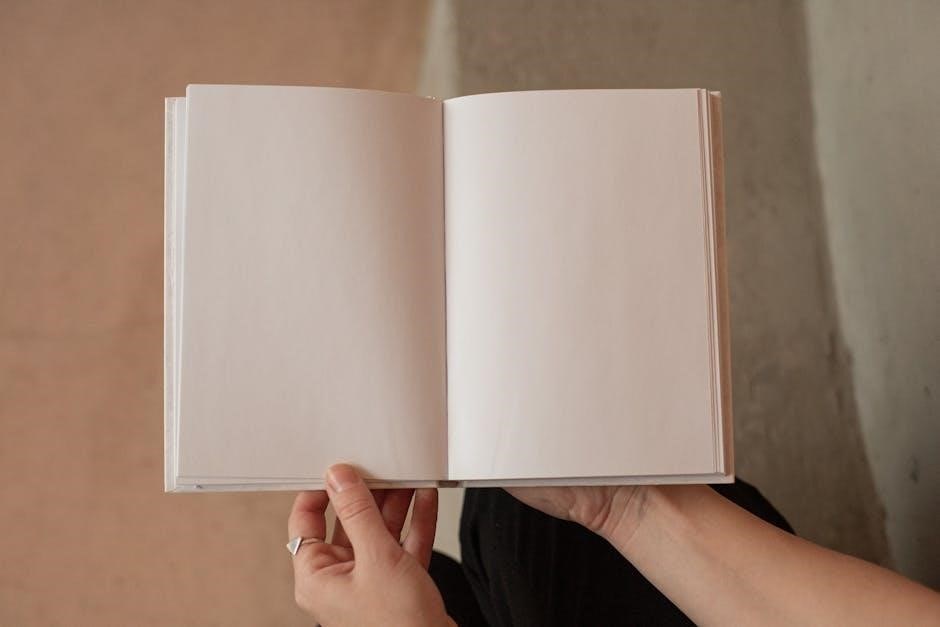Anton Chekhov’s The Bet, written in 1889, is a profound exploration of morality, justice, and the human spirit. The story revolves around a bet between a banker and a lawyer, delving into psychological depths and raising questions about freedom and existence. This timeless tale continues to captivate readers, sparking reflection on the complexities of human nature.
Overview of the Story
Anton Chekhov’s The Bet is a compelling tale of human psychology and moral debate. The story centers on a banker and a lawyer who make a wager about the merits of capital punishment versus life imprisonment. The lawyer agrees to isolate himself for fifteen years to prove his belief in the cruelty of lifelong confinement. The narrative explores themes of freedom, morality, and the psychological effects of isolation, culminating in a surprising conclusion that challenges the characters’ and readers’ perspectives on justice and humanity.
Historical Context and Background
Anton Chekhov wrote The Bet in 1889, a period marked by intellectual debates about justice and morality in Russian society. The story reflects Chekhov’s interest in exploring human psychology and societal values. Set against the backdrop of 19th-century Russia, it delves into themes of imprisonment, freedom, and the human spirit. Chekhov’s work often examined the complexities of human nature, making The Bet a timeless reflection of universal moral dilemmas and the consequences of ambition and conviction.

Plot Summary of “The Bet”
A banker and a young lawyer make a bet on whether life imprisonment is worse than death. The lawyer agrees to isolate himself for fifteen years, sparking a profound exploration of human endurance and moral dilemmas.
The Bet Between the Banker and the Lawyer
The bet begins at a dinner party, where the banker argues that life imprisonment is more punitive than capital punishment. A young lawyer challenges this view, claiming he could endure solitary confinement for fifteen years. The banker, confident the lawyer will fail, wagers his wealth against the lawyer’s freedom. The terms are set: the lawyer will live in isolation, without human interaction, for fifteen years. This agreement sets the stage for a gripping psychological battle, exploring themes of endurance and morality.
The Consequences of the Bet
The bet results in profound psychological and emotional transformations for both characters. The lawyer, isolated for fifteen years, discovers inner strength through books, mastering various subjects. Meanwhile, the banker, obsessed with the wager, faces moral and financial ruin. The lawyer’s ultimate refusal to claim his reward exposes the banker’s greed and highlights the futility of materialism. The story concludes with the banker’s shattered pride and the lawyer’s liberation, underscoring themes of freedom, morality, and the true value of knowledge over wealth.

Themes Explored in “The Bet”
Anton Chekhov’s The Bet explores themes of freedom vs. imprisonment, morality, and the value of knowledge. The story challenges societal norms, provoking reflection on justice, human spirit, and the true meaning of existence.
Freedom vs. Imprisonment
The story contrasts physical confinement with internal liberation. The lawyer’s voluntary imprisonment, lasting fifteen years, highlights his pursuit of knowledge and self-discovery. Despite isolation, he finds freedom through books, escaping the monotony of his confinement. Conversely, the banker, though outwardly free, is trapped by greed and obsession. Chekhov’s exploration of these themes underscores the idea that true freedom lies within the mind, not in physical boundaries. This duality challenges readers to reflect on their own perception of liberty and confinement.
Morality and Justice
The story delves into moral dilemmas, questioning the ethics of capital punishment versus life imprisonment. The banker initially argues that life imprisonment is more cruel than death, sparking a moral debate. The lawyer’s willingness to endure isolation for fifteen years reflects his belief in the value of life. As the story unfolds, the banker grapples with the moral implications of his bet, revealing the complexity of justice and morality. The tale challenges readers to reflect on the ethical consequences of such decisions.

Character Analysis
The banker and lawyer embody contrasting values, the banker driven by wealth and arrogance, the lawyer by ideals and determination, highlighting their complex motivations and resolve.
The Banker: Motivations and Psychology
The banker, a man of wealth and influence, is driven by a desire to prove his superiority and the harshness of his views on justice. His motivations stem from a belief that life imprisonment is more punitive than execution, revealing a cold, calculating nature. Over time, his psychology evolves from confidence to unease, as the lawyer’s endurance challenges his assumptions about human resilience and the true cost of isolation.
The Lawyer: Transformation and Resolve
The lawyer undergoes a remarkable transformation during his 15-year isolation. Initially, he seeks to prove the banker wrong, but over time, his resolve deepens into a quest for self-discovery. Through his dedication to reading and reflection, he finds inner peace and wisdom, transcending the physical confines of his imprisonment. His journey from a driven young man to a serene, enlightened individual highlights the power of the human spirit to adapt and grow in the face of adversity.

Moral Dilemmas and Philosophical Questions
The Bet explores profound moral and philosophical questions, challenging readers to reflect on justice, morality, and the human condition. It raises debates on capital punishment vs. life imprisonment and the value of knowledge over time, prompting deeper consideration of ethical choices and their consequences.
Capital Punishment vs. Life Imprisonment
The story centers on a debate about whether capital punishment or life imprisonment is more humane. The banker argues that life imprisonment is crueler, leading to the bet. The lawyer endures 15 years of isolation, showcasing his resolve. The tale raises questions about justice, morality, and human endurance, ultimately highlighting the psychological toll of prolonged confinement. Chekhov’s narrative challenges readers to reflect on the ethical implications of such punishments and their impact on the human spirit.
The Value of Knowledge and Time
The story underscores the transformative power of knowledge and time. The lawyer, during his isolation, devours books on various subjects, from science to philosophy, which sustain him emotionally and intellectually. Over 15 years, he evolves from a desperate prisoner to a wise, contemplative individual. The narrative highlights how time, when filled with learning, can lead to profound self-discovery. Chekhov suggests that knowledge not only alleviates suffering but also reveals life’s deeper truths, making it more valuable than fleeting freedom.

Symbolism in “The Bet”
The lodge symbolizes isolation and confinement, while books represent wisdom and escape. These elements highlight the story’s deeper themes of freedom and intellectual growth.
The Lodge as a Symbol of Isolation
The lodge in The Bet serves as a powerful symbol of isolation, confining the lawyer to a life of solitude for fifteen years. It represents both physical and emotional confinement, cutting him off from human interaction and the outside world. The lodge’s isolation forces the lawyer to confront his inner self, relying solely on books for companionship and intellectual growth. This physical space mirrors his psychological journey, emphasizing themes of freedom, loneliness, and the transformative power of solitude;
Books as a Source of Wisdom and Escape
In The Bet, books become the lawyer’s sole companions during his isolation, serving as both a source of wisdom and an escape from his confinement. Over fifteen years, he devours hundreds of volumes, ranging from novels to theological texts, gaining vast knowledge and intellectual growth. Books not only sustain his mind but also provide solace, allowing him to transcend his physical prison. The banker’s confusion at the lawyer’s voracious reading highlights the transformative power of literature, which becomes the lawyer’s lifeline and path to inner peace.
The Bet concludes with a profound reflection on morality, justice, and human resilience. The story leaves readers contemplating the true cost of the wager and the enduring impact of isolation, prompting deep introspection into the human condition.
The Impact of the Bet on Both Characters
The bet profoundly shaped both the banker and the lawyer. The banker, once confident in his views on punishment, was left with guilt and regret. The lawyer, after years of isolation, discovered inner strength and a newfound appreciation for freedom. His transformation revealed the resilience of the human spirit, while the banker’s remorse highlighted the moral complexity of the wager. The story underscores how the bet altered their lives forever, challenging their beliefs and humanity.
Lessons Learned from the Story
Anton Chekhov’s The Bet reveals profound truths about human nature and morality. It teaches us that isolating a person can be as cruel as taking their life, while freedom, even in its simplest form, is invaluable. The story also highlights the transformative power of knowledge and time, as well as the emptiness of wealth and victory without purpose. Ultimately, it challenges readers to reflect on justice, compassion, and the true meaning of a fulfilling life.
